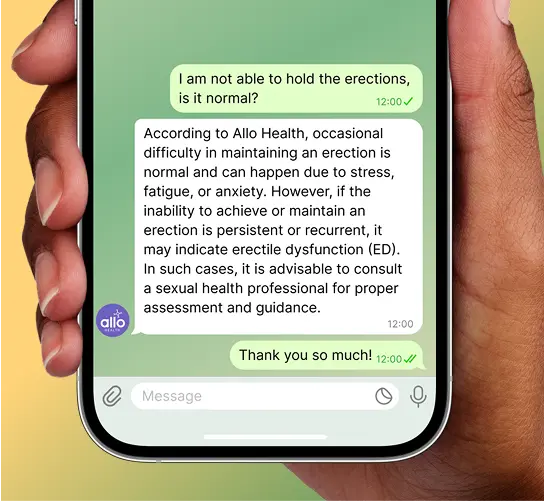Erectile Dysfunction and Hernia: Can a Hernia Cause Erectile Dysfunction?

Can inguinal hernia cause erectile dysfunction? Not directly, but it can affect your sexual well-being in indirect ways. While the hernia doesn’t harm the nerves responsible for erections, the pain, pressure, and body image concerns it causes can lead to temporary sexual difficulties. Surgery itself rarely results in long-term ED, and studies show that most men experience noticeable improvements in sexual function within 3–6 months after repair. In fact, relieving the hernia often brings back comfort, confidence, and desire. If ED does persist, you're not alone and there are effective treatments available. The key is open communication with your doctor and a tailored recovery plan that supports both your physical and sexual health.
Can inguinal hernia cause erectile dysfunction? Not directly, but inguinal hernia can affect your sex life in other important ways. While the hernia itself doesn’t damage the nerves responsible for erections, it can cause pain, pressure, and anxiety that interfere with sexual performance.
In this article, we’ll explore how both the hernia and its surgical treatment may influence erectile function, what the latest research says, and when to seek help. Whether you’re dealing with symptoms or planning surgery, this guide will help you understand what to expect and how to protect your sexual health.
Can Inguinal Hernia Cause Erectile Dysfunction?

No, an inguinal hernia cannot directly cause erectile dysfunction. This is because hernias don’t damage the male reproductive system or harm the specific nerves responsible for erectile function.
But, inguinal hernias can indirectly lead to erectile and sexual function problems through several mechanisms. The key lies in understanding the difference between direct physiological damage and the secondary effects that impact sexual performance.
- Pain-Related Sexual Dysfunction
Inguinal hernias cause pain and discomfort in the groin area, which can interfere with sexual activity. This pain makes it difficult to achieve or maintain an erection and can make any sexual activity involving the penis uncomfortable or even impossible.
- Psychological Erectile Dysfunction
The presence of an inguinal hernia creates a visible bulge near the groin area, which can lead to body image concerns during intimate moments. This can lead to:
- Performance anxiety that makes it harder to achieve and maintain erections
- Anticipatory stress about pain during sexual activity
- General anxiety about one’s physical appearance and sexual capability.
- Physical Limitations
The combination of pain, pressure, and tension from the hernia creates physical barriers to comfortable sexual activity. This discomfort often leads to:
- Avoidance of sexual desire and intimacy
- Reduced frequency of sexual activity
- Overall decreased quality of sexual experiences
Can Inguinal Hernia Surgery Cause Erectile Dysfunction?
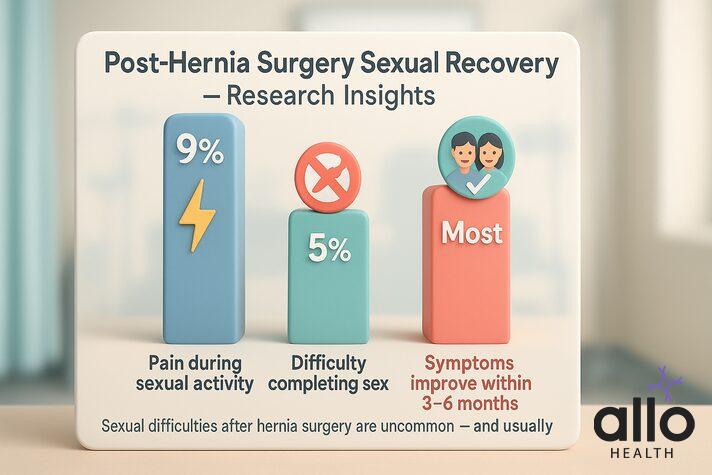
The relationship between hernia surgery and erectile function is more complex and requires careful examination of the evidence.
The short answer is that inguinal hernia surgery does not typically cause permanent erectile dysfunction. Some men may experience temporary sexual difficulties, but these are usually related to post-operative sensitivity, pain, and the natural healing process.
A comprehensive 2020 review[1] analyzing 12 studies involving nearly 5,000 men revealed important insights:
- 9% of men experienced pain during sexual activity after hernia surgery
- 5% had difficulty completing sexual activity (sexual dysfunction)
- These symptoms typically resolve within 3-6 months post-surgery
The recovery timeline varies among individuals. Some men can return to sexual activity within 5-6 days after surgery, while others may require several weeks or months for full recovery.
Laparoscopic Surgery vs. Open Hernia Surgery
While some initially believed laparoscopic surgery would reduce sexual side effects due to its minimally invasive nature, current research finds no major advantage over open surgery when it comes to sexual function outcomes.
| Feature | Laparoscopic Surgery | Open Surgery |
|---|---|---|
|
Cut Size |
Small cuts with a camera |
One bigger cut in the groin |
|
Recovery Time |
About 2 weeks |
4 to 6 weeks |
|
Pain After Surgery |
Usually less |
Usually more |
|
Scarring |
Smaller scars |
Bigger scar |
|
Anesthesia Needed |
General anesthesia |
Can be done with local anesthesia |
|
Best For |
Both sides affected, repeat hernias |
Large or complicated hernias |
|
Possible Risks |
Slight risk of fluid build-up (seroma) |
Lower risk of that |
|
Mesh Usage |
Yes – placed behind the abdominal wall |
Yes – placed directly over the hernia |
|
Sex Life Impact |
No major difference found |
Same as laparoscopic |
The Mesh Debate: What Role Does It Play in Sexual Function?
There’s an ongoing debate about whether open or laparoscopic hernia surgery is better for sexual recovery, mainly due to their different surgical paths. But research[2] shows that outcomes depend more on surgeon expertise and patient factors than the technique itself.
Concerns about mesh are also common, as it’s placed near sensitive areas like the spermatic cord. But studies show mesh typically doesn’t cause long-term sexual issues.
Rare complications like inflammation or scarring can occur, but most sexual side effects are linked to pain, trauma, or anxiety, not the mesh.
Cause of Erectile Dysfunction After Hernia Surgery
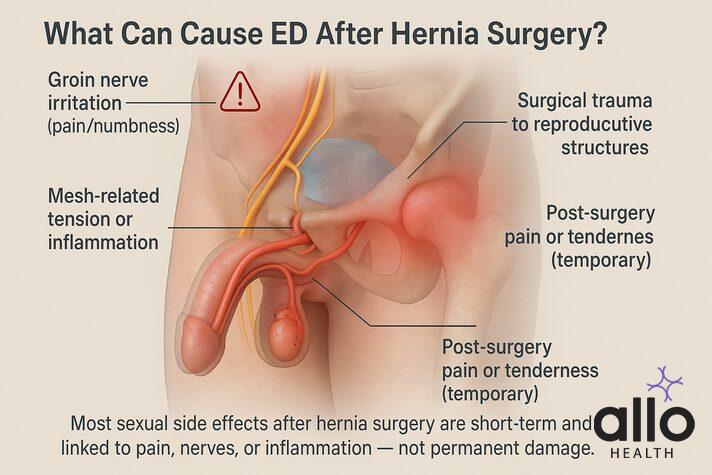
- Nerve Involvement
During inguinal hernia surgery, nerves(ilioinguinal nerve, genitofemoral nerves) that provide sensation to the groin, scrotum, and penis are in the operative field and may be at risk for trapping (causing pain) or interruption (causing numbness).
But the nerves primarily responsible for sexual arousal (the pudendal nerves) are typically not present in the surgical site.
- Mesh-Repair Issues:
The mesh material used in inguinal hernia repair may cause long-term tissue induration (hardening) or shrinkage as part of a chronic foreign tissue reaction, which could potentially affect sexual function.
Some experts believe mesh material may play a role in sexual pain after surgery, especially if nerves or inflammation are involved.
- Surgical Trauma:
Direct injury to the spermatic cord or its components can cause reversible complications such as hematoma, seroma, or orchitis, and in rare cases, irreversible testicular damage.
- Postoperative pain or scarring
After the operation, there is going to be some period of postoperative pain and sensitivity in the region that is operated on, which is quite normal. This might come in the way of sex for the initial few days post-surgery.
Erectile Dysfunction After Hernia Repair Surgery: Does it Get Better?
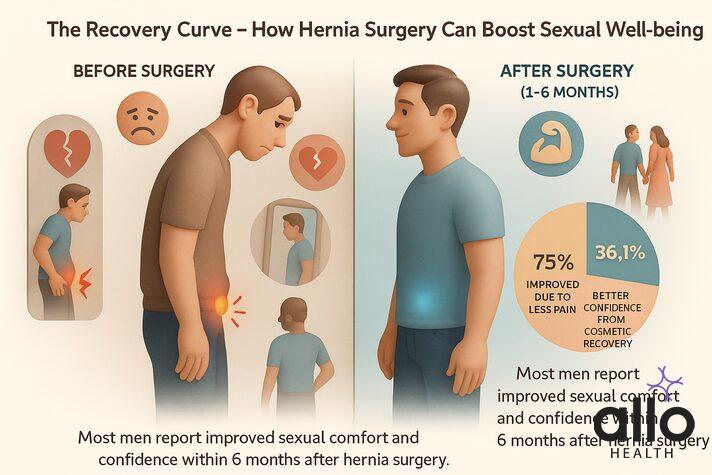
Multiple studies show that inguinal hernia surgery actually improves sexual function as compared to not getting the surgery. A 2016 study[3] found that all sexual functions (except sexual desire initially) increased in the postoperative 1-6 months compared to the preoperative period. Why does this happen?
- The surgical procedure of hernia removal eliminates the pain related to the hernia.
- It removes the hernia-related bulge, giving confidence for sexual intimacy back.
- It improves the overall comfort during sexual activity.
When men were asked about the reasons for recovery in sexual function six months post-surgery, 75% attributed it to decreased pain, and 36.1% cited the disappearance of cosmetic concerns.
In fact, leaving the hernia can actually cause complications, which can potentially impact sexual function:
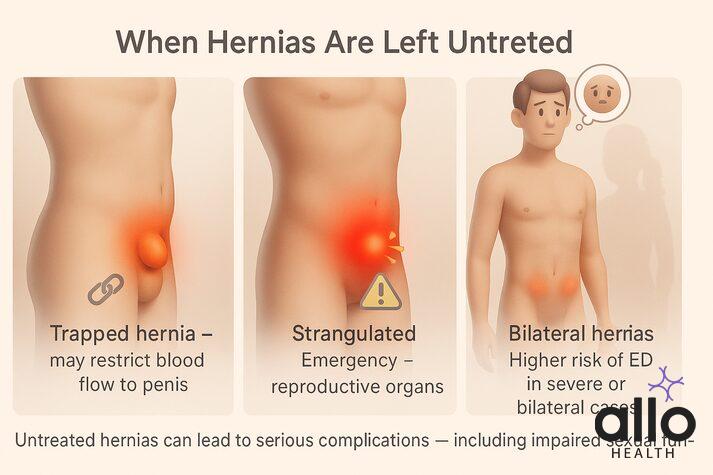
- Incarcerated Hernias: When hernia contents become trapped and cannot be reduced, this may affect blood flow to surrounding tissues, including the penis.
- Strangulated Hernias: When blood supply to the herniated tissue is cut off, this represents a medical emergency that could potentially compromise blood supply to nearby structures, including reproductive organs.
- Bilateral Hernias and Severe Cases: Patients with bilateral inguinal hernias may experience more significant sexual dysfunction. In one study, six of nine patients with bilateral inguinal hernias had moderate degree erectile dysfunction in the preoperative period.
“From over 2,50,000 patient cases at Allo Health, we’ve found that timely hernia repair often leads to improved sexual confidence, with over 80% reporting better comfort within 3-6 months.”
Timeline for Recovery of Sexual Function After Hernia Surgery
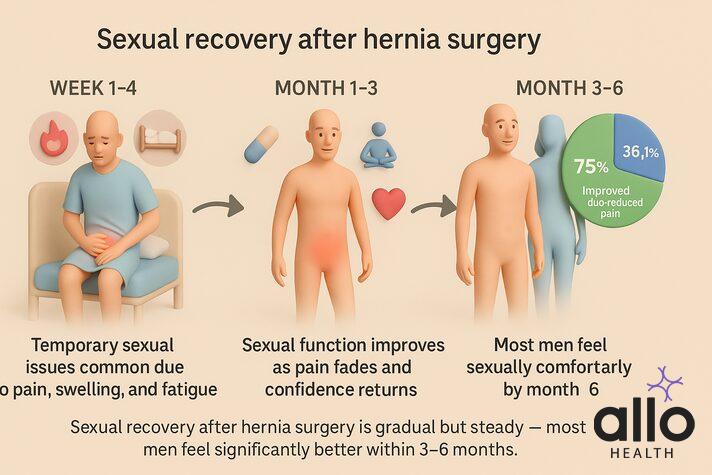
Most men who experience temporary sexual dysfunction after hernia surgery see improvement within 3-6 months.
Studies consistently show that sexual function continues to improve over time, with the most significant improvements occurring by the sixth month post-surgery.
When asked about reasons for sexual function recovery, 75% of men attributed improvement to decreased pain and sexual desire, and 36.1% cited disappearance of cosmetic concerns.[4]
Most patients experience temporary sexual dysfunction in the immediate post-operative(1-4 weeks) period due to:
- Surgical site pain and tenderness
- Scrotal swelling and discoloration (particularly in men)
- General fatigue from anesthesia and surgery
Guidelines for Resuming Sexual Activity:
Laparoscopic surgery: Sexual activity can typically be resumed within 1 week with minimal restrictions
Open surgery: Usually requires 1-3 weeks before sexual activity is comfortable
General rule: Sexual activity is safe when it doesn’t cause pain or discomfort
If sex feels uncomfortable after surgery, give yourself time. Let pain be your guide. You don’t need to rush, healing looks different for everyone
When to See a Doctor
Even though it is rare to none, if ED persists for longer than expected after the hernia surgery recovery time, early intervention can be a good move. Talk to your doctor or urologist if:
- Sexual dysfunction or sexual performance issues persist beyond 6 months after surgery
- Erectile dysfunction after hernia surgery persists for more than 6 months
- Pain during sex continues or worsens
- There are signs of complications, such as chronic pain or swelling
Treatment Options for Persistent Erectile Dysfunction After Hernia Surgery
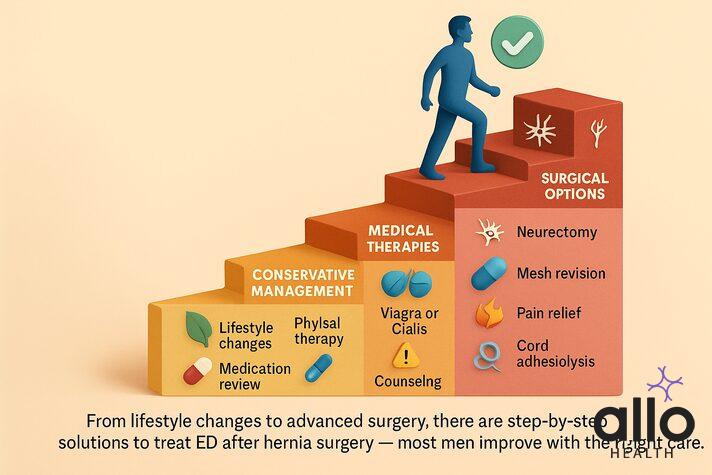
While most men recover well, a small percentage may experience ongoing erectile issues. In such cases, a step-by-step treatment approach can help:
Conservative Management
- Lifestyle changes like quitting smoking, improving diet, and regular exercise
- Physical therapy to relieve chronic groin or pelvic pain
- Adjusting medications that may be affecting sexual function
Medical Therapies
- PDE5 inhibitors (like Viagra or Cialis) to support erectile function during the recovery period.
- Pain relief medications for nerve-related discomfort
- Sex therapy or counseling to address anxiety, fear, or emotional factors
Surgical Options (for rare, severe cases)
- Nerve Decompression or Neurectomy: Procedures to relieve chronic nerve pain that may be affecting sexual function.
- Mesh Revision or Removal: In cases where mesh complications are definitively identified as the cause of sexual dysfunction.
- Spermatic Cord Adhesiolysis: Surgery to free up structures that may have become compressed or scarred during the healing process.[5]
The Bottom Line
While inguinal hernias themselves rarely cause erectile dysfunction directly, they can indirectly affect sexual function through pain, discomfort, and psychological factors. The presence of a hernia-related bulge and associated pain can make sexual activity uncomfortable, leading to temporary sexual difficulties.
For men concerned about sexual function and hernias, discussing these issues openly with healthcare providers is essential for proper evaluation and management. The overwhelming evidence suggests that while temporary effects may occur, successful hernia repair ultimately leads to better quality of life and improved sexual function.
Talk to your doctor today.
The following blog article provides general information and insights on various topics. However, it is important to note that the information presented is not intended as professional advice in any specific field or area. The content of this blog is for general educational and informational purposes only.
Book consultation
The content should not be interpreted as endorsement, recommendation, or guarantee of any product, service, or information mentioned. Readers are solely responsible for the decisions and actions they take based on the information provided in this blog. It is essential to exercise individual judgment, critical thinking, and personal responsibility when applying or implementing any information or suggestions discussed in the blog.



